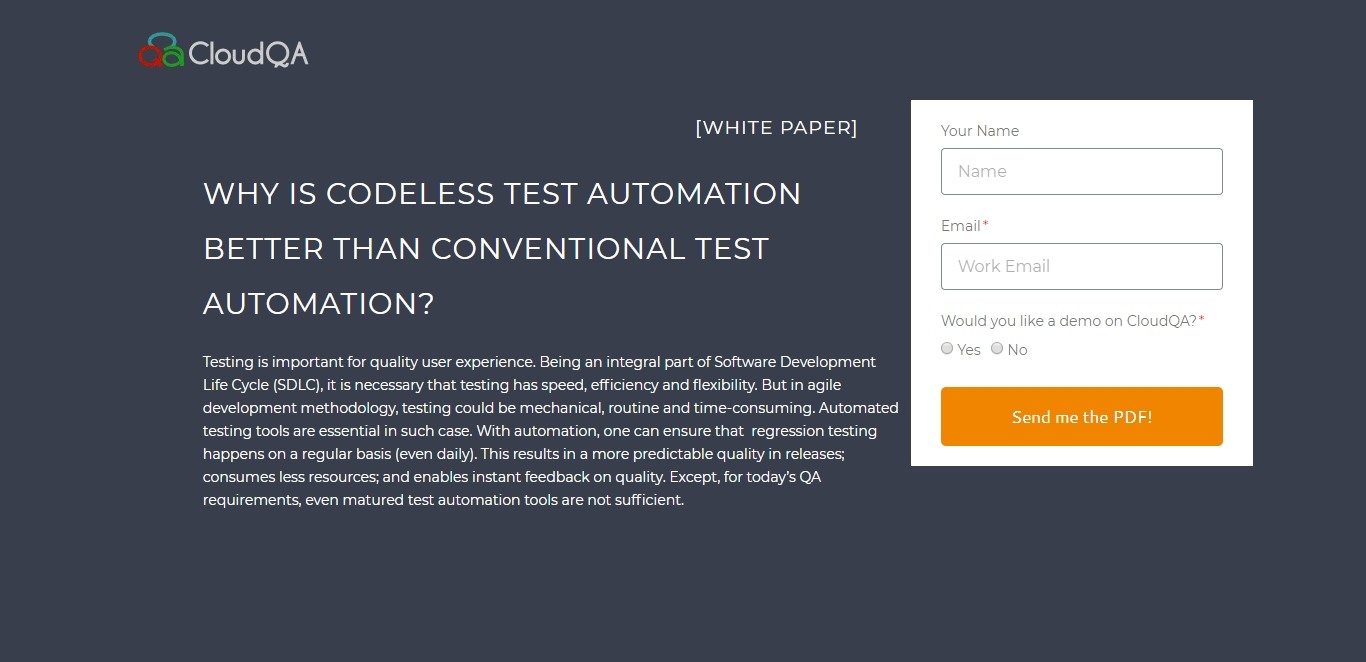Top Five Reasons to use Synthetic Monitoring Tool
Our last article on Load Testing mentioned about website crash happening due to high traffic. So how does the website owner know if the website has crashed? Thanks to different techniques of Application Performance Monitoring[APM] such issues could either be reported in Real-time or may not even surface because of Synthetic/Active monitoring. Our current post would talk about Why customers need Synthetic Monitoring and how our solution Site Monitoring @CloudQA could help our customers to measure and optimize website performance. Let’s get started-

What is Synthetic Monitoring
Synthetic monitoring is a technique that uses Web browser emulation to simulate real time environment and performs tests at a particular interval for response time, availability and functionality of the website.
Here are Top Six Reasons for using Synthetic Monitoring for your website-
- Testing of application from end user’s perspective
- Monitors application 24*7
- Know the Impact of third party components on your website performance
- It provides a comprehensive set of diagnostic data you need to debug problems anywhere
- Helps in providing accurate SLA thereby strengthening relations with the customer
- It provides a stable and consistent environment to measure performance at all hours of the day, over a period of weeks or months helping in benchmarking or baselining the metrics.
Concerned about the user experience? Start Monitoring today!
Get Started Now. No Credit Card Required
How Synthetic Monitoring @CloudQA is Helping its Customers
CloudQA offers Site Monitoring solution that helps in testing the availability, response time and performance of your website in a safe and efficient manner. Our solution is easy-to-use and maintain and could be setup with just some clicks.
Here are top five reasons to use CloudQA Site Monitoring Solution for your websites –
- Re-Use your automated functional test cases for synthetic monitoring without altering a single line of code
- No monitoring over simulated browsers but real time browsers as the end users [Chrome, Firefox, IE]
- Monitoring equipped with the latest standard WebDriver protocols, that generate requests from real-browsers.
- Selenium-based scripting of measurement workflows with form data submission and user actions to test business logic and performance
- Quantify and analyze real user experience, not some proxy metric with page performance load times from the browser timing and navigation APIs
This is not all!
To our global customers, we are gearing up to reduce the monitoring schedule from 15 minutes to 5 minutes, and very sure that we may soon see a requirement to reduce it further to every minute ping. And we promise to deliver with a smile 🙂
A happy customer is one who does not hit a blocker on your website. Our Synthetic monitoring tool will help you resolve issues before the real users encounter them. So, indeed it’s a win-win situation for you and your customer. Make your customer happy, won’t you?
LIKE THIS POST SHARE IT WITH YOUR FRIENDS
RECENT POSTS
Guides

How To Select a Regression Testing Automation Tool For Web Applications
Regression testing is an essential component in a web application development cycle. However, it’s often a time-consuming and tedious task in the QA process.

Switching from Manual to Automated QA Testing
Do you or your team currently test manually and trying to break into test automation? In this article, we outline how can small QA teams make transition from manual to codeless testing to full fledged automated testing.

Why you can’t ignore test planning in agile?
An agile development process seems too dynamic to have a test plan. Most organisations with agile, specially startups, don’t take the documented approach for testing. So, are they losing on something?

Challenges of testing Single Page Applications with Selenium
Single-page web applications are popular for their ability to improve the user experience. Except, test automation for Single-page apps can be difficult and time-consuming. We’ll discuss how you can have a steady quality control without burning time and effort.

Why is Codeless Test Automation better than Conventional Test Automation?
Testing is important for quality user experience. Being an integral part of Software Development Life Cycle (SDLC), it is necessary that testing has speed, efficiency and flexibility. But in agile development methodology, testing could be mechanical, routine and time-consuming.






